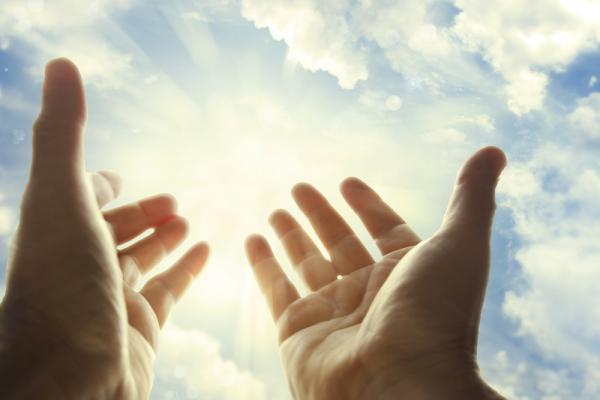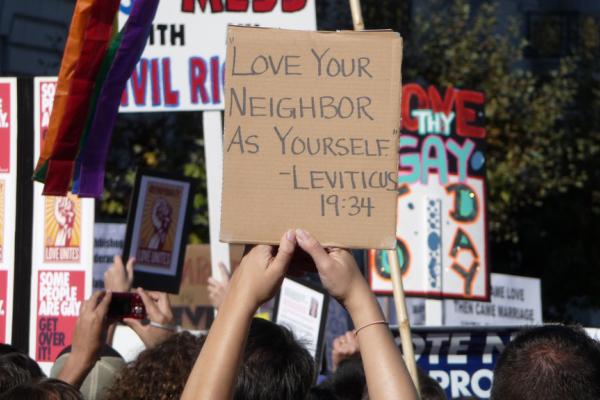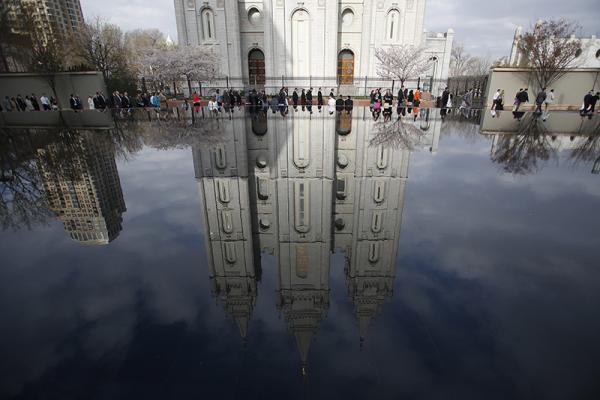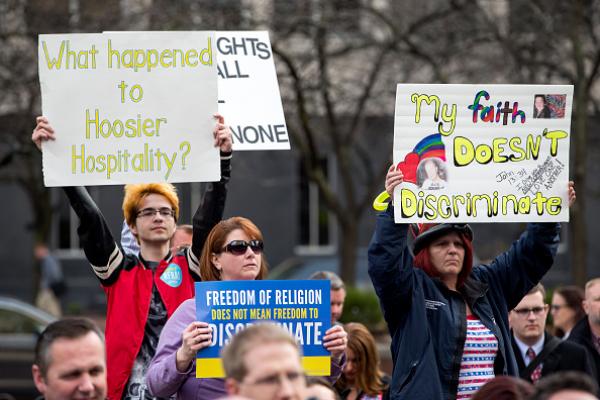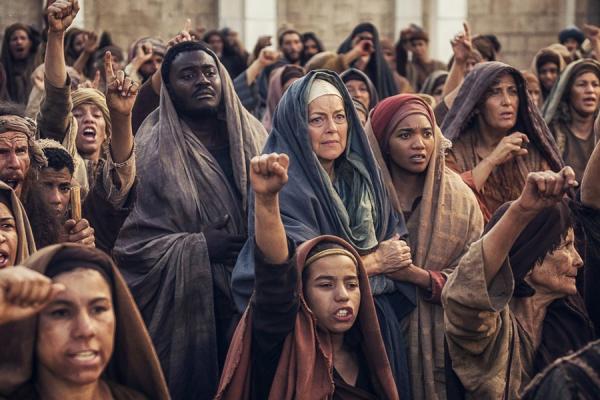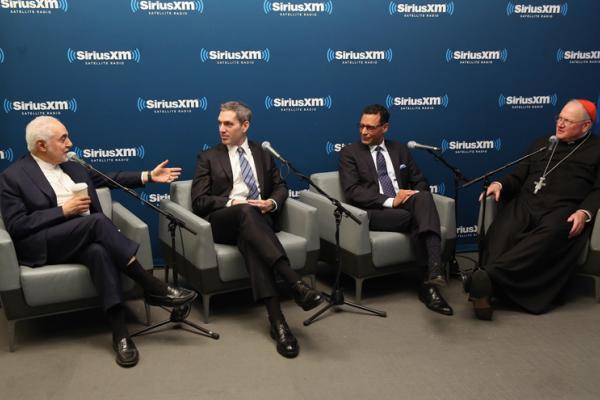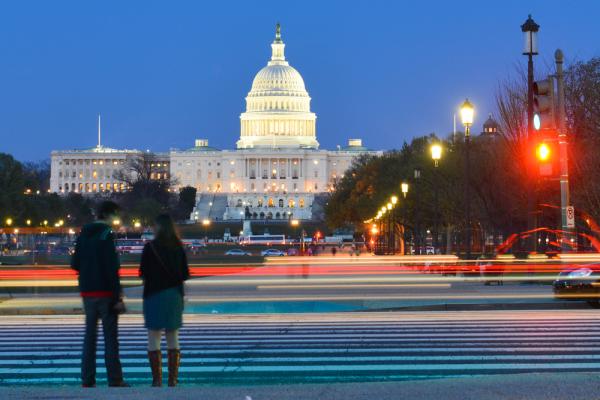Systemic theology lecturer Dr. Ben Myers talks about Jesus' prayer, "deliver us," and how following his example leads us not to optimism nor pessimism but into hope.
"The prayer of Jesus teaches us quite a different way of looking at the world. He acknowledges the presence of evil in our lives. He acknowledges that there are things in this world that are bent out of shape ... that no amount of human effort could make right. ...When we join our voice with the voice of Jesus we catch a glimpse of the world as it really is — vulnerable, hurt, yet poised on the brink of redemption."
Editor's Note: Since original publication of this piece, Indiana lawmakers have announced changes to the Indiana RFRA legislation that includes anti-discrimination language.
Last week Indiana found itself at the center of the news cycle for all the wrong reasons. With Gov. Pence’s signing of the state's Religious Freedom Restoration Act, our nation once again found itself taking sides in the debate over LGBTQ rights.
Honestly, I’m torn over this issue. I understand that the Indiana bill was fashioned after the 1993 bill that was signed into federal law by Bill Clinton. I know that 19 other states have RFRA legislation. And, as a pastor, I support religious freedom, not just for Christians, but for Buddhists, Muslims, Jews, and yes, even Westboro Baptists. I think most Americans support protecting individuals' rights to conscientiously practice their faith. Freedom of religion is one of the things that makes this country great, and that freedom is worth protecting. But this bill, supposedly enacted to protect those freedoms, has caused quite the stir. Even more interesting to me are the people I follow on social media who are much more interested and knowledgeable than me in politics who say Indiana’s RFRA won’t amount to significant change. This raises the very simple question, “Then why pass the bill?”
This is Holy Week, the most sacred time of year for Christians. It is the time they mark the betrayal, trial, and crucifixion of Jesus, and a week that culminates in Easter Sunday, the day Christians believe Jesus rose from the dead. So what do colored eggs have to do with anything? Let us Egg-‘Splain …
Q: Is Holy Week really a whole week? I only know about Good Friday and Easter Sunday.
A: Holy Week is the entire week between Palm Sunday and Easter Sunday. Not a whole lot happens on Monday and Tuesday, but some Christians mark the crucifixion on Wednesday, and some celebrate Maundy Thursday, the day of the Last Supper, Jesus’ final Passover meal with his disciples. It is sometimes celebrated with a foot-washing ceremony, a tradition beloved by Pope Francis, and a “Pascha” or “Paschal” meal, derived from the Jewish Passover Jesus would have known. Then comes Good Friday, Holy Saturday, and Easter Sunday. Fun fact: Not all American Christians greet each other with “Happy Easter.” To many evangelicals, the day is “Resurrection Sunday,” in part because they believe the word “Easter” has pagan roots.
Q: What is so “good” about Good Friday, the day Jesus was horribly tortured to death?
A northern Nigeria Muslim leader who promised to pursue a nonreligious agenda as president will now have to deal with an Islamic terrorist insurgency that has wreaked chaos in the country’s north.
Muhammadu Buhari, 72, a former military ruler and a Muslim, beat incumbent Goodluck Jonathan, 57, a Christian from the country’s south, in a race held under the shadow of Boko Haram violence.
Not all Nigerians are happy with Buhari’s election, given his past human-rights record as president from January 1984 to August 1985. During that time, he imprisoned journalists and opposition activists without trial and executed drug traffickers by firing squad.
But Nigerians, both Christian and Muslim, hope he is better-suited to battle Boko Haram, despite being a Muslim himself.
Sixteen-year-old Grayson Moore had no label, only metaphors, to describe the disconnect he felt between his body and soul.
It was like car sickness, he says, when your eyes and inner ears disagree about whether you are moving.
“It makes you sick,” Moore says.
“That’s the same with gender.”
When Moore’s mother gave her then-daughter a vocabulary for the feelings — “gender dysphoria,” or transgender — an immediate sense of relief followed.
And, he says, God confirmed that he was not just a tomboy. He was in the wrong body.
Such moments come in the lives of transgender people — times when vague feelings of general discomfort with their identity crystallize into that realization.
When The Bible miniseries premiered two years ago, controversy swirled around its depiction of a dark-skinned Satan who some said resembled President Obama, as well as its portrayal of white main characters in the Moroccan landscape.
Fast-forward to the premiere of the sequel, A.D. The Bible Continues, on Easter Sunday (April 5), and you’ll see a decidedly more multicultural cast, the result of “honest” conversations between black church leaders and the filmmakers, Hollywood power couple Mark Burnett and Roma Downey.
“For too long religious programming has neither reflected the look of biblical times or the diversity of the church today,” tweeted the Rev. Barbara Williams-Skinner, a Maryland-based black activist, writer and scholar.
“We made this point to Mark and Roma after #BibleSeries, and quite frankly they listened. I’m glad for that.”
Now, in a partnership with the 12-part NBC miniseries, an African-American Christian publishing house will host online resources to help viewers connect the holy book to Africa.
Is religion the cause of so much of the violence racking today’s world? Or is faith just one of many factors? Or collateral damage?
Those are tough questions, the kind that are usually posed to religious leaders, not by religious leaders.
But Cardinal Timothy Dolan wanted to switch things up on his weekly radio show, so he invited a minister, a rabbi, and an imam to tackle that issue. What sounds like the opening line of a joke was actually an in-depth discussion of “the rise of religious intolerance.”
“I don’t know if there would be anything more pertinent today, or more timely today, than religious harmony, or the lack thereof,” Dolan, the Roman Catholic archbishop of New York, said March 31 in opening a special edition of his program on the Catholic Channel of the SiriusXM network.
“The elephant in the room is that today, whether we like it or not, religion is often the cause of scandal,” he said.
“Religion is supposed to be an overwhelmingly positive force that brings people together, that increases love and understanding, human progress and human enlightenment.”
But many people today — believers and nonbelievers alike — see religion as the opposite, he said, and “that keeps the four of us up at night.”
Over the past two weeks, Congress has considered multiple pieces of anti-immigrant legislation. Much of this legislation, introduced by Republicans, continues to promote rhetoric that criminalizes hard-working individuals living within the United States without documentation, endangers children who were born in America, and seeks to further punish children who are in search of refuge as they escape many forms of terror in Central America.
Although the legislative status varies for each piece, it is imperative for the public to be aware of the immigration reform policies being considered and how they impact our communities.
Brief overviews of three important anti-immigrant legislative pieces are summarized at the jump.
A new report by the Equal Justice Initiative documents in horrific detail the nation’s widespread practice of lynching and points to a link between lynching and a practice that persists today: capital punishment.
In the Jim Crow South, lynching declined as officials turned to executions as an alternative method for killing blacks in disproportionate numbers.
This report challenges us to confront our nation’s legacy of racial violence. Sadly, too many Christians were complicit in this violence, which has prompted Christian denominations to apologize and emphasize racial reconciliation. Last week, the Southern Baptist Convention held a two-day race summit in which it urged pastors to do more to diversify their churches.
These are important steps.
But they only mark time if important actions don’t follow.
